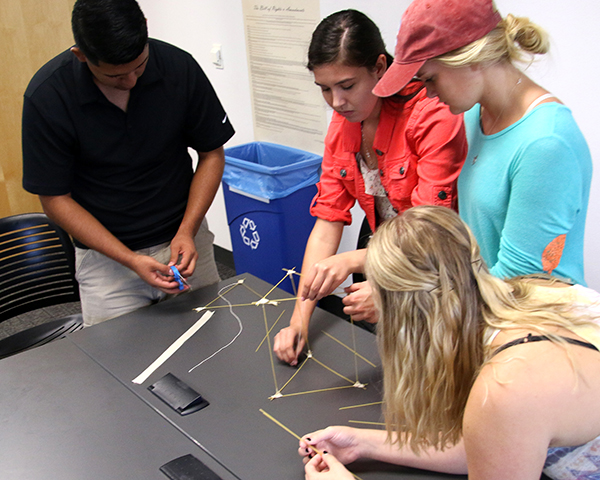
Project-based learning engages public service students
Michelle Silverio of Laveen, Arizona chose to attend Arizona State University after she heard about a new type of class that would give her hands-on experience as a freshmen social work student.
“I thought that senior year was when I would be out working with foster kids,” said Silverio.
But Silverio is already creating solutions in her field, as one of hundreds of ASU freshmen participating in a new learning pilot called ProMod. The program supports project-based instruction in student-focused areas of study while they tackle real life problems.
Associate Dean of the College of Public Service and Community Solutions and Associate Professor Cynthia Lietz is teaching one ProMod course offered to students enrolled in social work or public service and public policy degrees.
Students in Lietz’s ProMod course are engaged in hands-on, service learning opportunities from their freshman year onward. Last week, students participated in Hacks for Humanity, a two-day event that brought together community members to create software, apps, games and other technologies that contribute to social good. In late October, the class will participate in the college’s Day of Service, helping organize clothing banks, maintain community gardens and clean up various buildings at the Maricopa County Human Services Campus in downtown Phoenix.
ProMod is short for Project-Based Modular Learning, which engages students in interdisciplinary learning with real-world projects. It’s the first year the university will offer these kinds of lower division classes as part of a five-year grant from the U.S. Department of Education.
The First in the World grant partnership selected 24 universities to establish a system of innovative educational approaches and enhanced co-curricular support. Seven colleges throughout ASU began offering ProMod courses in the fall semester.
Students embedded in the community
The most important thing about her class, Lietz notes, is that students “learn by doing” and have ‘voice and choice’ about the specific projects they take on.
“The modular learning aspect is the idea there are fundamental competencies and students learn at their own pace,” said Lietz.
According to Lietz, less than 4 percent of former child welfare youth achieve an undergraduate degree.
To increase student understanding of the problem, students will spend time connecting with policy makers implementing SB 1208, a bill signed into law in 2013 that created a college tuition waiver for young adults who grew up in foster care.
For English requirements, students study literature related to foster youth. To meet philosophy and ethics requirements, discussions about ethical dilemmas are framed around issues facing foster youth. In one unit, students trace trends in child welfare policy.
As part of the project-based curriculum, students will work in groups to develop solutions to recruit and retain more former foster youth in higher education. The projects will all focus on the Bridging Success program to enhance recruitment and retention of former foster youth at ASU.
First piloted by the Arizona State University College of Public Service and Community Solutions earlier this year, Bridging Success is designed to connect foster care youth with the resources to pursue and finish a college education.
One student group might decide to create a website and initiate a social networking campaign that can reach former foster youth across Arizona to inform them of the waiver.
Other groups might decide to develop a peer-mentoring program or work on policy-related strategies to advocate for change.
The course also includes 60 hours of fieldwork collaborating with several agencies such as Arizona Friends of Foster Children Foundation to engage with foster youth in the community.
Silverio’s first experience working with homeless people occurred in September, when the class worked with the ASU initiative Project Humanities to collect donations and deliver items to benefit the Central Arizona Shelter Services in downtown Phoenix.
“I had never worked with the homeless before, so when I did, it was really moving,” said Silverio.
Lietz says ProMod creates real world learning experiences across multiple disciplines.
Meanwhile, ASU faculty are researching whether the students enrolled in the Project-Based Modular Learning program are more likely to complete their degrees than students who take the more traditional route.
“ProMod creates real world learning experiences across multiple disciplines while applying content from many classes at one time. It is truly innovative,” said Lietz.